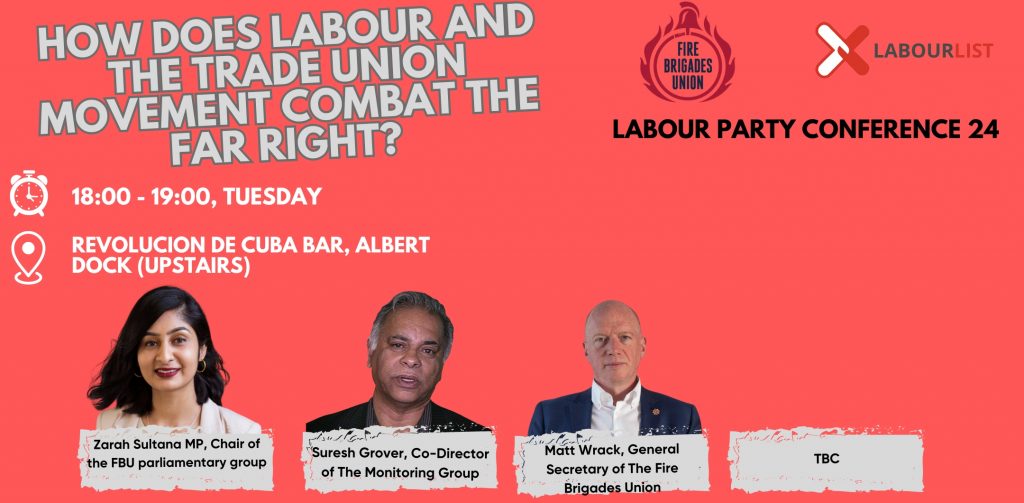
“Mother who took her child to a riot in a pushchair pleads guilty to violent disorder”. Rioters had gathered outside a Manchester hotel housing asylum seekers, chanting ‘save our kids’. The headline almost defies explanation: if you were concerned about your child’s safety, would you take them to a riot?
Punching up and punching down
This is, for me, the iconic image of August’s violence – the UK’s first conspiracy theory riots. Because the events which followed the tragic murder of three girls in Southport were not ‘traditional’ race riots. From the anti-Jewish pogroms of the nineteenth century through to the Enoch Powell-inspired National Front, ‘traditional’ race riots punch down. A powerful group attacks a weak group – because they are weak.
But August 2024 was different. In these riots, a more powerful group attacked a weaker group, believing (or claiming to believe) that the weaker group is actually powerful. The riots’ slogan was not ‘attack the immigrants’; it was ‘save our kids’.
The unfortunate people cowering in hotel rooms might have fled war and poverty, but they are believed to wield ultimate power over existing communities. In the warped minds of the rioters, ‘immigrants’ have supernatural powers – to sail boats across the Channel; to take any job they want; and to abuse white British children.

The perfect conspiracy theory
These rioters did not claim to punch down; they claimed to punch up. They claimed that a small group of people – national and local government, the police – operate almost like a secret cabal to bring immigrants to the UK, knowing that those immigrants will abuse the system. The majority lose; the minority win. Any deficiency in public services is not due to lack of funding or human mistakes – it is explained by ‘them’ taking what is rightfully ‘ours’. It is a perfect conspiracy theory – to the believer, it explains everything, and it cannot be disproved.
The riots appeared to most people as an offensive outburst of extreme violence against innocent, and defenceless, victims. Yet, to the conspiracy theorist, the riots were a righteous, and defensive, reaction. And there are many more conspiracy theorists than we might imagine.
Only seven percent of British adults supported the violence, but many more are susceptible to conspiracy theories which either invent ‘facts’ or make spurious links between actual facts. Around 60 percent of British adults believe in at least one conspiracy theory, and people who believe in one are more likely to believe in another. A person who believes that the Royal Family murdered Diana is more likely to also believe that immigrants conspire with the UK government to abuse British children. Individual conspiracy theories may not be mainstream, but the propensity to believe them certainly is.
And conspiracy theories are not a design fault – we have evolved to believe them. On the savannah, thinking the worst kept us safe: better to assume that a noise in the grass is a lion, rather than the wind. False positives are embarrassing; false negatives are deadly. Today, conspiracy theories appeal to our love of narrative, and displace our fear of chaos by explaining the supposedly inexplicable. They also appeal to our better nature – who doesn’t want to save kids? They disguise a negative as a positive: Save Our Kids! (by burning down a hotel with other kids in).
READ MORE: ‘Recovery from race riots can start us telling a new story for Britain if we choose’
Reform to Robinson to Riot
Conspiracy theories link the different layers of actors in the August riots. The populist right chanted ‘stop the boats’ from government podiums, and that was chanted back on the streets of Sunderland and Rotherham. Farage ‘just asked questions’ during the riots, telling his supporters clearly that ‘they’ are hiding the truth from ‘you’ (just like they always do).
On the extreme right, the online freelancers who organised so-called ‘demonstrations’ called for stopping the boats not just because of the migrants’ skin colour (punching down), but also because they’re coming for your job and your kids (punching up). Conspiracy theories were amplified by grifters like Tommy Robinson and Laurence Fox. And the far left is not immune – as seen by the ‘Get Zionists Out Of Finchley’ demonstration, fuelling online conspiracies that blame Israel and British Jews for the riots.

So, what is to be done?
First, distinguish between the extreme right and the populist right. The extreme right – both those who enabled the violence and those who took part in it – requires a criminal justice response. So do the social media and networks that provide platforms for hatred to grow and metastasise. The populist right requires something different – it requires us to remove the oxygen of grievance in three ways.
Mind your language
We have to consistently and repeatedly call out the conspiracy theories – you are not the victim of two-tier policing; ‘they’ don’t get given ‘your’ services. We should be clear that August’s violence was not a series of protests – they were riots (and events like the burning of the hotel in Rotherham was a pogrom).
Fill the potholes and cavities (nice Labour stuff)
These riots were in no way a legitimate demonstration against failing public services. But that doesn’t mean that services aren’t failing, or that poorer areas haven’t suffered more than wealthier areas under the Tories.
The British National Party were beaten in Barking & Dagenham in the 2000s by Labour adopting a laser-like focus on the issues that mattered to residents, however small they may be.
Voting Reform will not get you a dentist’s appointment, but too many people at the moment don’t think that any party can get you one. We have to prove them wrong.
READ MORE: ‘AfD: What lessons should Labour draw from far-right success in Germany?’
Harder stuff that we don’t like to talk about
More teachers and dentists is our Labour comfort zone; an immigration system which makes decisions quickly and fairly, and removes applicants who do not qualify, is not. But that is what is needed to give British people confidence in their borders, and to allow Labour to defend the rights of those people who are here.
Allied to this should be a much clearer offer to those who do remain in the UK, based on rights and responsibilities. Free English lessons, but an expectation that everyone will take them. Legal deadlines for decision and (if necessary) removal, but an immediate right to work thereafter.
And finally, we have to give migrants something positive to integrate into. Too often, the left behaves as if it is embarrassed by Britain: Refugees Welcome! (to this country that we don’t really like). It was noticeable how few British flags were flown at the counter-protests in August. That feels like a missed opportunity to show the racists that they do not get to define Britishness for the rest of us. A progressive patriotism is needed now more than ever.
The next conspiracy theory riot
Conspiracy theories are here to stay: we are hard-wired to believe them and social media now spreads them at a speed that would have made Goebbels salivate into his Der Strummer. But seeing the riots for what they are – a consequence of conspiracy theories consciously developed on- and off-line – allows us to craft responses which might address today’s violence and could anticipate tomorrow’s.
READ MORE: Sign up to our must-read daily briefing email on all things Labour
SHARE: If you have anything to share that we should be looking into or publishing about this story – or any other topic involving Labour– contact us (strictly anonymously if you wish) at [email protected].
SUBSCRIBE: Sign up to LabourList’s morning email here for the best briefing on everything Labour, every weekday morning.
DONATE: If you value our work, please donate to become one of our supporters here and help sustain and expand our coverage.
PARTNER: If you or your organisation might be interested in partnering with us on sponsored events or content, email [email protected].





More from LabourList
Scottish Parliament elections 2026: Full list of Labour candidates for Holyrood
‘As metro mayors gain power, Labour must tighten political accountability’
Letters to the Editor – week ending 22 February 2026